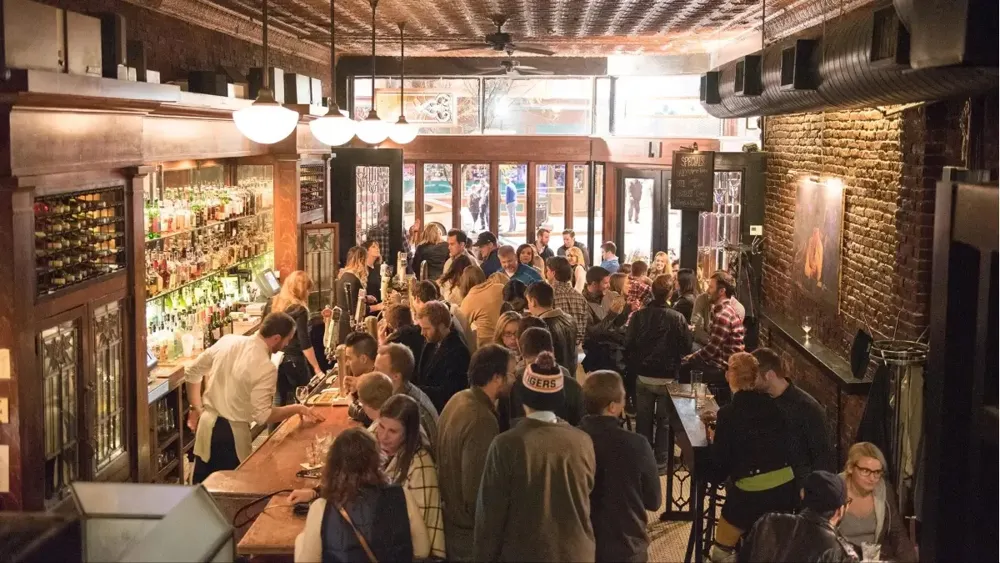‘Know What He Is All About’: Black Business Owners Allege All-White Board Deliberately Blocked Their Operations, Saying They Don’t Want ‘Young Hip-Hop Crowd’ In Kansas City Nightlife

Several Black business owners allege that a group that oversees an entertainment district in Kansas City, Missouri, took deliberate steps to hamper their operations until they were forced to either shut down or end their lease agreements. According to local news outlets, three different Black-owned businesses are suing the Westport Community Improvement District (CID) and its all-white board members, accusing them of racial discrimination and several civil rights violations. Westport is a historic neighborhood in Kansas City that is now home to a large entertainment district bustling with a vibrant nightlife. Entertainment district, Westport in Kansas City, Missouri. (Photo: Visitkc.com) But of the 251 business owners who operate in Westport, almost none of them are Black, according to the lawsuit as reported by KCTV. The entrepreneurs who are suing the CID allege that the group used tactics that made it “nearly impossible for Black/African American business owners to exist in Westport.” Black Business Owner Told ‘Hip-Hop Crowds Equated to Violence’ Robert Thorpe, who owns art gallery and event space The Sourze, operated in Westport and received approval in 2020 to expand the venue with a space for a restaurant called The Daiquiri Shop, according to the suit. Thorpe paid more than $50,000 in rent and other expenses connected to the expansion. However, the property management withdrew their approval for the concept, alleging that Thorpe's business would “cannibalize” other Westport bars and that establishments “patronized by the hip-hop crowds, equated to violence," the suit states. ‘Take a Hike!’: White Florist Fired After Video Goes Viral of Her Refusing to Service Black Customer In Texas Shop The lawsuit says those claims were steeped in "racist and stereotypical ideologies based on unfounded assumptions that all Black/African American people are violent.” The occupancy for Thorpe's space was also reduced from 200 to 80 people. However, without the ability to open, Thorpe was paying more money in overhead that he couldn't recover in revenue, which caused the business to fail, according to WDAF. Restaurant Owner Locked Out on Day of Hiring Event Christopher Lee and Damion Johnson signed a 10-year lease in October 2024 to open their restaurant, Euphoric, in Westport. Lee alleged he was urged to take a personality test before signing the lease, something that the white Westport entrepreneurs weren't given. He paid a $10,000 security deposit for the space, but as soon as Black promoters began posting that the restaurant was opening and hiring, CID board members “immediately began interfering with Euphoric’s plan to open its restaurant," the lawsuit states. The lawsuit claims that CID board member Brent Allred contacted Lee's landlord and pressured him to terminate the lease. Allred, who only knew Lee's name, racial background, and the fact that Black promoters started posting about his business, also told the property owner, “I already know what he is all about," the suit states. The complaint also claims that Allred expressed concerns to the property owner about the "type of crowd" Euphoric would attract and mentioned security issues. When Lee asked the landlord if it was “a culture thing,” the landlord responded, “Well, they’re afraid that it will bring violence,” according to the complaint. The landlord told Lee he needed to target “an older crowd” and “not that young hip hop crowd.” Even when the lease was still in effect, Allred and the landlord never gave Lee the keys to the space, which forced him to host his hiring event outside. The restaurant was also the target of disparaging and humiliating comments online, which claimed that Lee and Johnson's business was a fraud and that they didn't have permission to open the venue. Neighboring Businesses 'Offended' By Young R&B and Hip-Hop Crowd D'Mario Gray, owner of UnicKC, also signed a lease in October 2021 to rent a commercial property in Westport. His lease agreement included a noncompete clause that prohibited Gray's restaurant from selling pizza or competing with neighboring business, the Denver Biscuit Company. After Gray began renovations, he met with the owner of the Denver Biscuit Company to discuss plans for the space. According to the suit, Gray recalled the owner asking him about the placement of the door where patrons would be entering, whether Gray's business would be playing R&B and hip-hop, what type of crowd the club was drawing, and the age of his target market. When the Denver Biscuit Company owner learned from Gray that the business would cater to a young R&B and hip-hop crowd, the owner became “offended, dismissive, annoyed, agitated, and upset," the complaint states. Gray assured the owner that he'd be following security guidelines and employing police officers, which he included in the projections for the expenses the business would incur. Still, the Denver Biscuit owner contacted the company that Gray signed a lease with to complain about the business's opening, the suit states. The next day, Gray received a cease-and-desist letter and was locked out of his business, even though he had violated none of the lease terms, according to the suit. Gray was also allegedly told that several other business owners took issue with his business, saying the "type of crowd" it would attract would bring problems to Westport. The lessor of Gray's space paid him $100,000 to walk away from the agreement and indemnify itself from any legal action, according to the lawsuit. 'Do Everything We Can to Put Them Out of Business' The complaint also alleges there are recordings of CID members and Westport business owners admitting that using "Good Neighbor" agreements against 99 of the 251 entrepreneurs in the community keeps them “scared." CID board members and business owners can also be allegedly heard on the audio recordings saying that if the business owners don't sign those agreements, they “do everything we can to put them out of business.” The plaintiffs in the suit are demanding $70 million in damages from the CID for loss of wages, potential revenue and profits. Their complaint alleges racial discrimination, breaches of contract and civil conspiracy, among other claims. In a statement, the Westport Community Improvement District denied the allegations listed in the suit and asserted that the CID is committed to cultivating a diverse and inclusive district: While we cannot comment on the specifics of ongoing legal matters, we are confident that the facts will demonstrate the baselessness of these allegations against the CID and its Board members. For decades, Westport has been a welcoming and inclusive district — home to a vibrant mix of people, cultures, and businesses. Diversity has always been a strength of this community, and we remain committed to ensuring that everyone feels valued and supported here. We believe that diversity among business owners and patrons isn’t just the right thing to do — it’s good business. A thriving, inclusive environment benefits everyone and continues to make Westport one of Kansas City’s most dynamic destinations.

